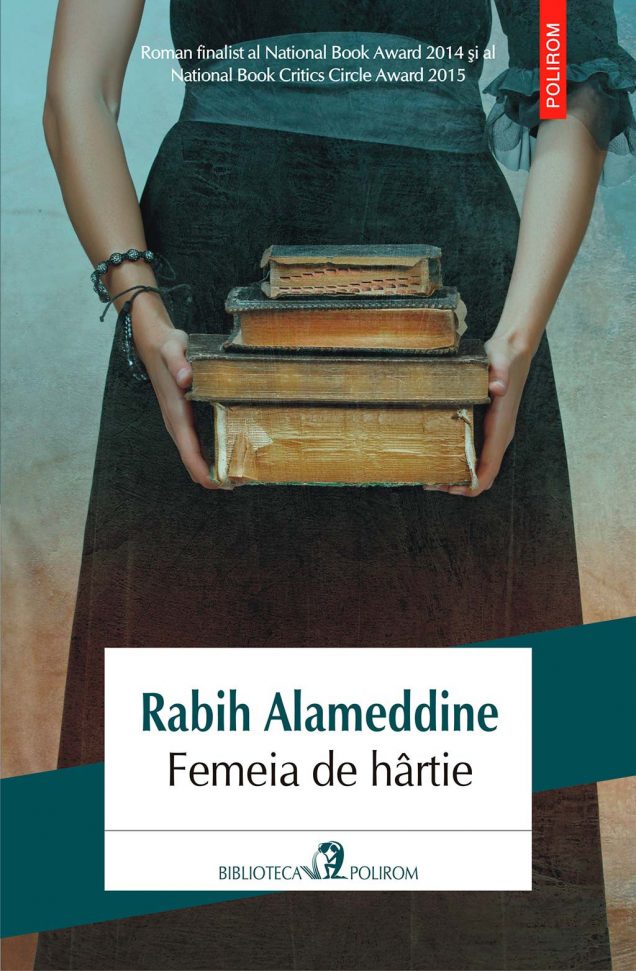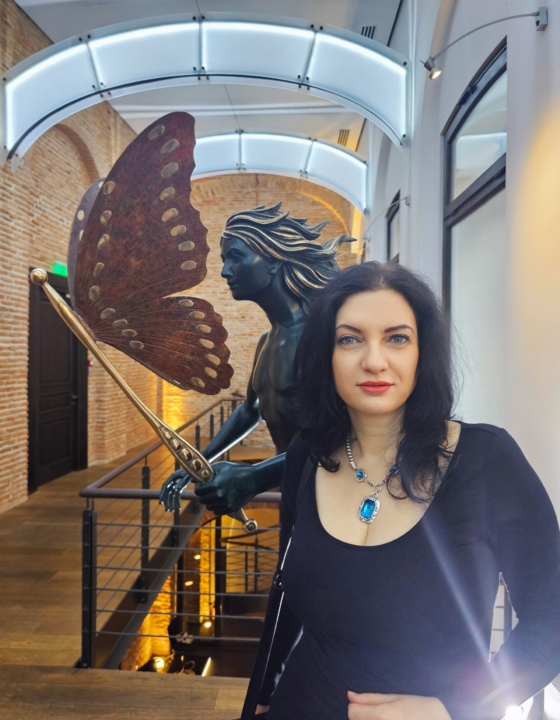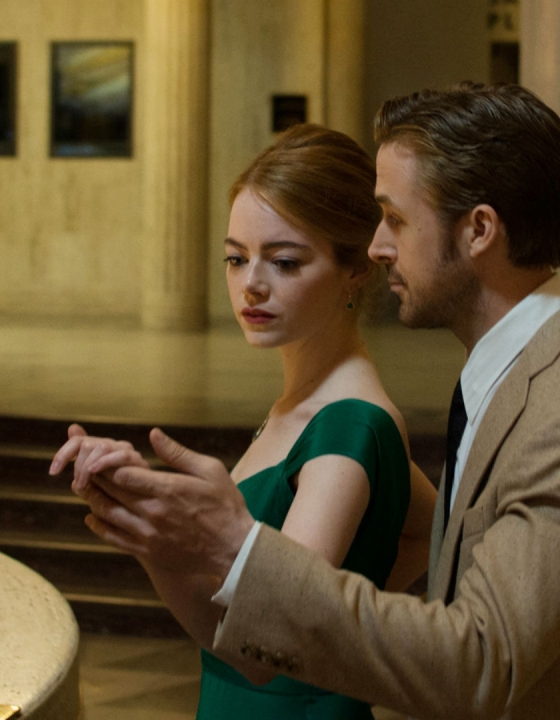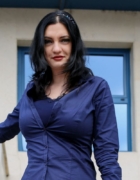72 years old Aaliyah tells us about her life, beginning with the ritual of having two glasses of red wine whenever she completes a translation and then revealing the reasons for which she dyes her hair blue. Such a cool start can only be followed by a complex story, woven from intensely coloured pieces, overlaid on the background of a mythical Beirut, shaken by wars.
It is quite captivating to watch a divorced young Arab’s growth through a humble job at the bookstore mainly because of the rough style of exposing behind the scene information from a world most of us only know one thing: that it is very different than ours. You need a good dose of humour to hold your head up and survive the sterile marriage with a „shrimp”, you need some boldness to sleep with an AK-47 in bed instead of a husband during the war, not to mention the openness of the mind, absolutely necessary to get the gun in the first place.
You basically need enough endurance to find flavour, purpose and determination in constantly adverse life situations. Aaliyah has them all and further more: the burning desire to learn, the passion for her work as an unpaid, anonymous translator, but also the excessively introspective nature which doesn’t diminish, however, her objective judgement of others and their functioning dynamics.
This is the main paradox of the „Unnecessary Woman”, who lives her own life among fictional characters, having more alive and authentic relationships with the authors of the books she translates than with the people of flesh and bones. The latter are portrayed accurately though with just a few significant details: the three neighbours also known as „the witches”, Fadia, Joumana and Marie-Thérèse, defined by their purely feminine habits: the ritualistic coffee gatherings, the always dyed and regularly styled hair, the feline curiosity and the skills of the resourceful people; the friendly security guard from the museum, categorizing visitors by secret codes, Aaliyah’s ex husband „the lethargic mosquito with defective trunk”; Ahmad, the studious teenager who successfully becomes a men hunter.
There is only one exception to all the episodic appearances: Hannah, her lifetime friend, to whom Aaliyah devotes a lot of space in her thoughts and on paper. The red haired, greedy Hannah is thoughtfully and gently looked at by Aaliyah who uses her life movie to show us the sweetness of solitude shared between two extraordinary characters.
One of the most admirable parts of the novel is the roundness of the stories. It happens throughout the whole book, but it’s best highlighted in Aaliyah’s relationship with her mother, where the circle closes with biblical compassion. The new beginning comes rushing fast, releasing the past stored in boxes and swallowing the seemingly insurmountable distances between people.
There is only one more thing left to add to the recommendation of this book: the author, Rabih Alameddine is a man writing from the perspective of the female Lebanese universe. Which is not to be taken lightly, no matter how much of it is knowledge and how much is imagination…
Also published in Airport News magazine.
La 72 de ani, Aaliyah ne povestește viața ei, începând cu ritualul celor două pahare de vin roșu, care însoțește finalizarea unei traduceri și continuând cu dezvăluirea motivelor pentru care își vopsește părul albastru. Un debut atât de cool nu poate fi urmat decât de o poveste complexă, țesută din fragmente intens colorate, suprapuse peste fundalul unui Beirut mitic, scuturat de războaie.
Elevarea unei tinere arabe divorțate prin intermediul unei slujbe modeste, la o librărie, este captivant de urmărit, în principal datorită stilului frust de expunere a informațiilor behind the scene dintr-o lume despre care majoritatea știm doar că e foarte diferită de a noastră. Îți trebuie ceva umor ca să supraviețuiești, cu tonusul ridicat, căsniciei sterile cu un “crevete”, ceva îndrăzneală ca să dormi cu un AK-47 în pat, în loc de soț, în timpul războiului, nemaivorbind de absolut necesara deschidere a minții pentru a rostui, în primă instanță, arma.
Îți trebuie, în general, suficientă anduranță ca să găsești savoare, rost și determinare în situații constant potrivnice de viață. Iar Aaliyah le are pe toate acestea, la care se mai adaugă dorința de autocultivare, pasiunea pentru munca ei titanică, de traducătoare voluntară și anonimă, dar și interiorizarea excesivă care, însă, nu-i știrbește cu nimic din realismul obiectiv cu care-i apreciază pe ceilalți și dinamica după care funcționează.
Acesta este principalul element paradoxal al „Femeii de hârtie”, care-și trăiește propria viață între personaje fictive, relaționând mai autentic și mai viu cu autorii cărților parcurse și traduse, decât cu oamenii din carne și oase. Aceștia sunt punctați totuși din detalii surprinzător de exacte, care le fixează conturul cu precizie: cele trei vecine, “vrăjitoarele”, Fadia, Joumana și Marie-Thérèse, au ca repere de esență feminină cafeaua savurată ritualic, părul vopsit și coafat cu regularitate, curiozitatea pisicească și îndemânarea de om descurcăreț; paznicul amabil de la muzeu, categorisind vizitatorii prin coduri secrete; fostul soț al lui Aaliyah, “apaticul țânțar cu trompă defectă”; Ahmad, adolescentul studios ajuns cu succes vânător de oameni.
Există o singură excepție de la aparițiile episodice mai mult decât suficiente pentru a surprinde poveștile personale ale celorlalți: Hannah, prietena ei de mulți ani, căreia îi dedică mult loc în gânduri și pe hârtie. Hannah cea lacomă și cu părul roșu e privită cu ochi atent și blând, de Aaliyah care ne-o dezvăluie în filmul vieții ei cu finețe psihologică, arătându-ne, totodată, dulceața împărtășirii solitudinii între două personaje aparte.
Unul dintre cele mai admirabile aspecte ale romanului este rotunjimea poveștilor. Se întâmplă pe tot parcursul lui, dar cel mai bine pus în evidență este în relația lui Aaliyah cu mama ei, unde închiderea cercului se face după modelul compasiunii biblice. Noul început vine apoi cu pași distrugători și repezi, eliberând trecutul depozitat în cutii și înghițind distanțele aparent insurmontabile dintre oameni.
Un singur lucru mai am de adăugat la recomandarea acestei cărți: autorul, Rabih Alameddine, este bărbat și scrie din perspectiva universului feminin libanez. Ceea ce nu-i puțin lucru, indiferent cât e cunoaștere și cât e imaginație….
Publicat și în revista Airport News.


















What do you think?
You must be logged in to post a comment.